US Senators Propose Alternative To Iran Nuclear Deal
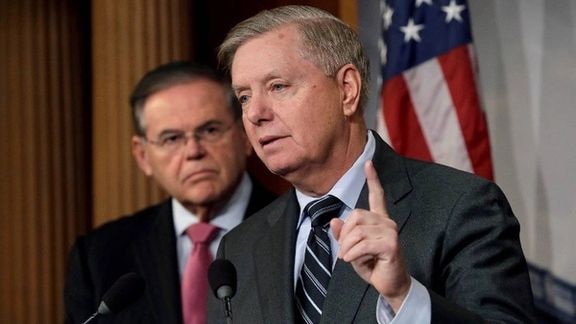
Two senior US senators have called for a regional nuclear fuel bank to provide a new approach for containing proliferation in the Mideast, including by Iran.

Two senior US senators have called for a regional nuclear fuel bank to provide a new approach for containing proliferation in the Mideast, including by Iran.
Democrat Bob Menendez and Republican Lindsey Graham introduced the bipartisan resolution aimed at avoiding a destabilizing arms race in the Middle East on Friday.
The resolution calls on the US government to adopt a policy that allows any Middle Eastern state access to nuclear fuel if they forgo uranium enrichment and reprocessing, based on the model of the existing nuclear fuel bank created by the International Atomic Energy Agency (IAEA).
The establishment of a regional fuel bank would allow the commercial development of nuclear power throughout the region while at the same time eliminate the need for dangerous and destabilizing domestic nuclear programs.
The proposal also makes clear that a commitment by Iran to end its enrichment program should be met with a US commitment to provide sanctions relief beyond the measures contained in the Joint Comprehensive Plan of Action.
Other sanctions should remain in place until Iran verifiably ceases its “other malign activity, including its support for terrorism, its human rights abuses, its hostage-taking, and its destabilizing activities in the region”.
Menendez, the chairman of the Senate Foreign Relations Committee, said Iran is on the brink of having enough material for a nuclear weapon, noting that “this new compromise can provide Iran appropriate sanctions relief while swinging the doors open to permanently solve this nuclear crisis once and for all”.
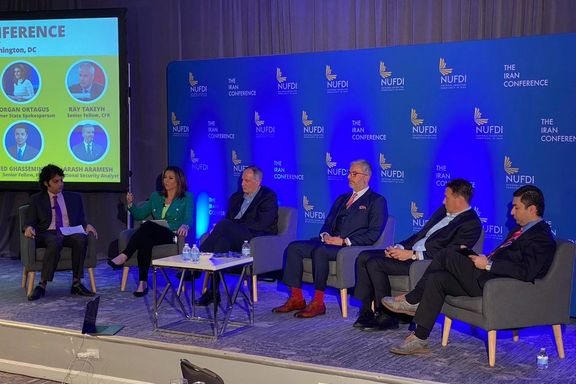
Activists, experts and former officials gathered for a conference to discuss human rights in Iran and issues related to Tehran's military and regional threats.
The February 10 event was organized by the National Union for Democracy in Iran (NUFDI), a nonprofit organization of Iranian Americans who want to raise awareness about the country. The conference was attended by leading experts and activists who have close involvement with issues related to Iran or a keen interest.
During the event, former United States Special Envoy for Iran Elliott Abrams spoke about the difference between Iran and the Islamic Republic, saying that Washington often only focuses on one issue such as the hostages or Tehran’s nuclear program and forgets that there is a country with tens of millions of people there who are being repressed by the regime.
“The problem is not Iran… it’s the Islamic Republic”, he underlined, saying that “the people of Iran never voted to support Houthi attacks on the Emirates and Saudi Arabia. The people of Iran never voted in a referendum if they should have a policy of death to America, death to Israel”.
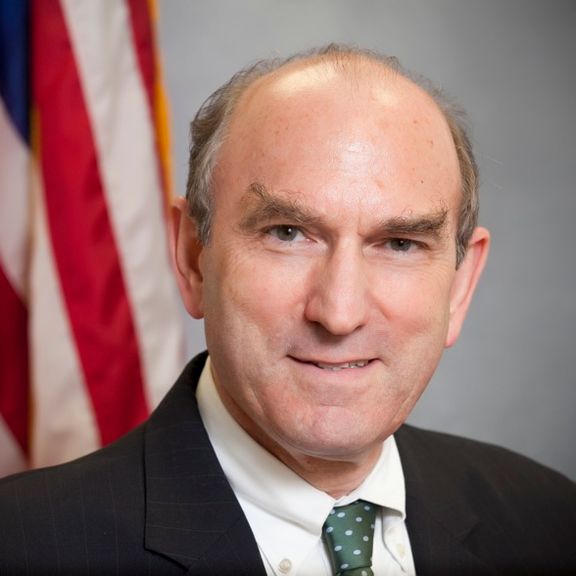
He added that there is “too little attention about the human rights situation in the country”.
Abrams argued that there is no unified theory on how to deal with Iran, for example Israel is worried about the Islamic Republic building a nuclear bomb but Saudi Arabia is concerned about Iran’s support for Houthis or the proxy militias in Iraq.
“If you say regime change, people think you mean war” but this is not how the US seeks regime change in Iran. “We stand with the people of Iran in their desire for hopefully peaceful change toward a democratic regime”.
By regime change, “we mean allowing the people of Iran to determine their own future”, Abrams stated.
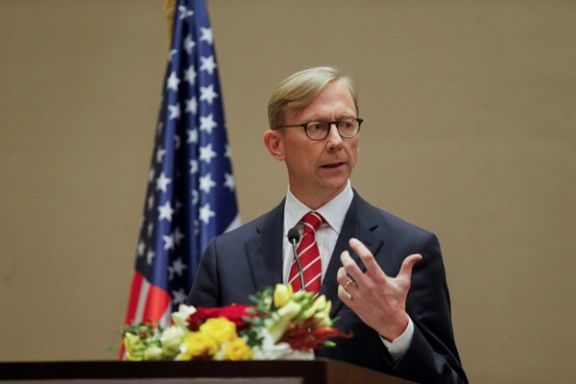
Brian Hook, also a former US special representative for Iran, described the Islamic Republic as the “world’s leading state sponsor of terrorism” noting that Iran’s claims about peaceful nuclear power are not true because they continue enriching uranium.
He defended Donald Trump’s decision to leave the nuclear deal, saying that when such a country is talking about peaceful nuclear power and continues enriching uranium, “if you accept it, it would be hypercritical to tell others that they cannot enrich”.
“We should not be resigned to Iran as a nuclear threshold state; it will change the balance of power in the Middle East profoundly”, Hook said, adding that “if talking and dialogue worked, we would have solved it a long time ago. We have to put in place a campaign of pressure, diplomatic, economic, all of it”.
He said the Iranian regime should understand that enrichment is a non-negotiable issue, saying all the talks with Iran should be focused on this.
Iran ramped up its enrichment after the Trump administration fully sanctioned its oil exports in May 2019 and took it to a higher level when President Joe Biden signaled he was ready to negotiate and restore the JCPOA.
Hook said that he is worried if the Vienna talks reach a conclusion that sees sanctions lifted and Iran back to the Swift global banking system and opening the economy, “that money doesn’t go to the Iranian people; it goes to Hezbollah, Hamas, PIJ (Palestinian Islamic Jihad) and Yemen”.
The former diplomat said the Iranian regime “is the last revolutionary regime on earth” with a global ambition and expressed hope that “over time the Iranian people would have a truly representative government”.
Morgan Ortagus, the spokesperson for the US Department of State from 2019 to 2021 said that Secretary of State Antony Blinken had promised a longer and stronger deal with Iran, but it seems that what the US is getting now is “even worse than the original deal in 2015”.
Ortagus described the deal as a “political football” adding that “If and when Republicans get back to power… they get out of the deal again”.
She criticized “the failed mindset of a deal or a war” saying that the JCPOA is “a very flawed deal” and it is getting even worse if you take the terrorism sanctions off, when Iran has done nothing to deserve having those sanctions lifted.
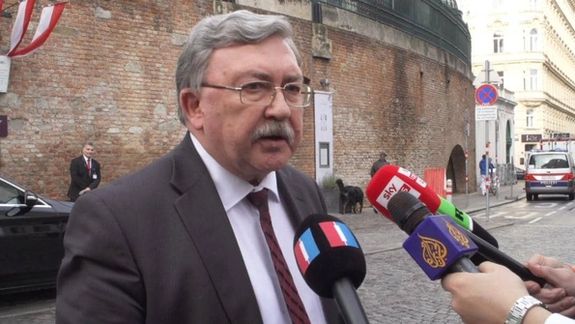
Mikhail Ulyanov, Russia’s lead negotiator in the Vienna talks on Iran’s nuclear program, tweeted twice Friday to signal progress.
At 1.13pm, he posted a photo across a table from Robert Malley hailing “another very useful meeting” with the United States Special Envoy on Iran and noting “we are definitely moving ahead.”
At 4.13pm Ulyanov sent out a second tweet, with a photo across the table from Enrique Mora, the senior European Union official chairing talks among world powers seeking to revive the JCPOA, the 2015 agreement limiting Iran’s nuclear program from which President Donald Trump withdrew the US in 2018.
Ulyanov wrote he had had “in-depth discussion” with Mora on what “a final document …may look like.” Ulyanov had previously expressed optimism that this could be done by the end of February.
A final document would contain details of which sanctions the United States would lift as incompatible with the JCPOA and exactly how the Iranian nuclear program, expanded and developed since 2019, would be returned to JCPOA limits. It would also be expected to contain a timetable for ‘sequencing’ such moves.
Western European negotiators in recent days have also said they are more hopeful. The lead United Kingdom negotiator and director for Middle East and North African affairs Stephanie Al-Qaq tweeted Thurday that her meeting with Iran’s lead negotiator Deputy Foreign Minister Ali Bagheri Kani and Mora has seen a “constructive exchange.”
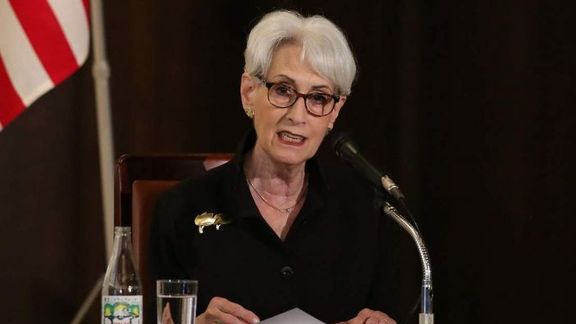
Faced with increasing pressure from Republicans, US Deputy Secretary of State Wendy Sherman, has denied that Iran has the upper hand in Vienna nuclear talks.
In an interview with MSNBC Thursday, Wendy Sherman – who was closely involved in negotiating the 2015 agreement, the JCPOA (Joint Comprehensive Plan of Action) – said “all options” were on the table regardless of what happened in Vienna. Other administration officials have portrayed reviving the JCPOA was an alternative to military confrontation.
"We're not going to [just] accept anything Iran has to offer,” Sherman said. “We will re-enter the JCPOA in its fullness if Iran maintains compliance with it. And all of our options always remain on the table, regardless of what gets chosen here."
Politicians in Tehran have increasingly highlighted Iran’s surviving the ‘maximum pressure’ sanctions imposed by the US since 2018 – with the economy returning to growth after two years’ deep recession and oil exports slowly increasingsanctions still officially in force.
Some Iranian media have also detected an upper hand in the expansion of the nuclear program, including enrichment up to 60 percent, since 2019. Foreign Minister Hossein Amir-Abdollahian who has been under attack recently domestic opponents, said February 5 that talks in Vienna would be "seriously continued with full hands."
Saeed Jalili, a former nuclear negotiator and a JCPOA opponent, tweeted on February 8:“They [the US] were saying that Iran’s oil exports should reach zero, while after three years we are selling 1.2 million barrels per day… and this volume is increasing,”
Sherman’s interview came as opponents of the JCPOA in Washington stepped up attacks on the Biden administration. In a letter to President Joe Biden earlier this week, Republican senators led by Ted Cruz argued Congress should review any ‘new’ deal. Administration officials have pointed out they aim to revive an existing agreement that Republican president Donald Trump left in 2018 without approval from Congress.
Nuclear arsenal
"As a result of President Biden's weakness and appeasement, this administration is ramping up to give a nuclear arsenal to the Ayatollah in Iran," Cruz said in the Senate February 7.
US supporters of reviving the deal have argued that Iran’s nuclear program, which was limited by the JCPOA, has expanded since Trump stormed out of the agreement and imposed ‘maximum pressure,’ and that continued expansion of the nuclear program outside the JCPOA risks military confrontation with Israel or the United States.
President Ebrahim Raisi reiterated Friday that Iran was pinning no hopes on reviving the JCPOA and had confidence in its own abilities and resources. Both Raisi and predecessor President Hassan Rouhani have consistently argued that despite ‘maximum pressure’ Iran will not accept demands beyond the terms of the JCPOA.
Negotiators in Vienna have said the talks may be nearing agreement. In a tweet Thursday, Mikhail Ulyanov, Russia's lead negotiator, suggested the process was at"the final stage. German Foreign Minister Annalena Baerbock said Thursday in Tel Aviv she was “convinced that a full restoration of the JCPOA would make the region more secure, including Israel.”
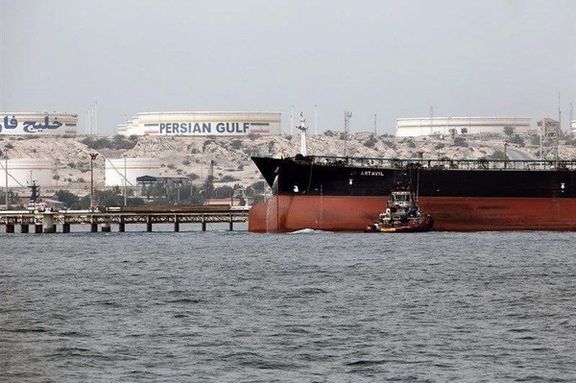
More reports from industry sources confirm that Iran’s oil exports have risen despite US sanctions, as each side tries to build leverage in nuclear talks.
Reuters reported on February 10 that in the past two months daily shipments have surpassed one million barrels a day, the highest since May 2019, when the Trump administration cancelled waivers allowing eight countries to import limited quantities of Iranian oil.
Between May 2019 and late 2020, Iran’s clandestine oil exports hovered around 200,000 bpd, or 10 percent of its sales before Donald Trump withdrew from the Iran nuclear agreement, JCPOA, and imposed sanctions.
However, around the time of US presidential elections in the fall of 2020, reports emerged that Iran had increased shipments to more than half a million barrels per day.
This coincided with the time when candidate Joe Biden announced his decision to reverse Trump’s policy of ‘maximum pressure’ against Iran and start negotiations to revive the JCPOA.
The latest news about higher exports, reported by Reuters quoting industry sources, coincide with the most critical phase of indirect nuclear talks the Biden Administration started with Iran more than 10 months ago. The talks held in Vienna involve all the signatories of the JCPOA, including China that is widely believed to be the biggest customer of Iran’s illicit exports.
The Chinese government that mostly abided by the sanctions, increasingly shows defiance to the Biden Administration. A spokesman responded to questions about its oil imports by Reuters, implicitly confirming and challenging the sanctions.
The "international community, including China, has been conducting normal cooperation with Iran under the global legal framework, which are both reasonable and legitimate. They deserve respect and safeguard," the spokesperson's office of China's Foreign Ministry said.
Tehran clings to these sort positions by China and Russia in order to demand more in Vienna, and Iranian hardliners tell domestic audiences that Tehran is in a strong position and does need to compromise.
Saeed Jalili a former nuclear negotiator and an opponent of the JCPOA tweeted on February 8, before the latest reports, “They were saying that Iran’s oil exports should reach zero, while after three years we are selling 1.2 million barrels pd…and this volume is increasing.”
This is a sign of how more oil exports strengthen the hand of hardliners who oppose any compromise with the United States and push for expansion of the nuclear program.
In another tweet, Jalili posted a video of a speech to supporters of the Iranian regime, in which he says the US policy of pressuring Iran has failed and uses a clip from the State Department spokesperson, Ned Price declaring the sanctions policy as an utter failure, to prove to the public that there is no fear and Iran should stand tall.
American proponents of a tough policy toward Iran accuse the administration of abandoning sanctions enforcement amid nuclear talks and allowing Iran to increase oil exports, which could harm their own leverage in Vienna.
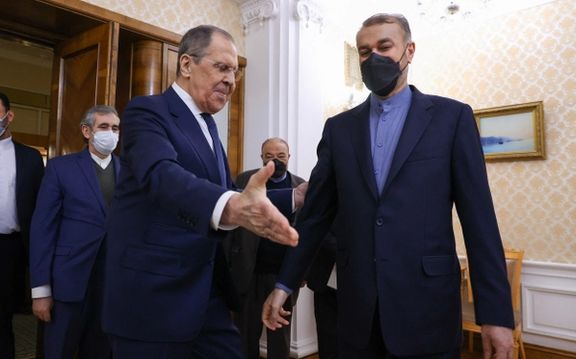
Russia has said there is still a long way to go in the Vienna talks before the 2015 nuclear deal between Iran and world powers can be revived.
According to Reuters, Foreign Minister Sergei Lavrov made the remarks on Thursday as indirect talks between Tehran and Washington to salvage the deal resumed on Tuesday after a 10-day break.
Although the negotiating teams in Vienna give little away as to whether they are closer to resolving the thorny issues, Lavrov’s comment is in contradiction to that of Mikhail Ulyanov, Russia’s lead negotiator and its ambassador to the International Atomic Energy Agency, who said the talks were “five minutes” from the finish line.
“A draft of the final document has been crafted,” he said. “There are several points there that need more work, but that document is already on the table.”
Reiterating Iran’s demand that the US remove all sanctions imposed under ‘maximum pressure’ since 2018 when the Trump administration left the 2015 deal (the JCPOA, Joint Comprehensive Plan of Action), Foreign Minister Hossein Amir-Abdollahian said Monday that “the latest texts obtained from the Vienna talks” failed to address “parts of our demands for the lifting of sanctions.”
Rob Malley, the White House Iran envoy leading the American team taking part indirectly in Vienna, told the MSNBC Friday that negotiators had not reached agreement on central issues, such as exactly which US sanctions should be lifted.